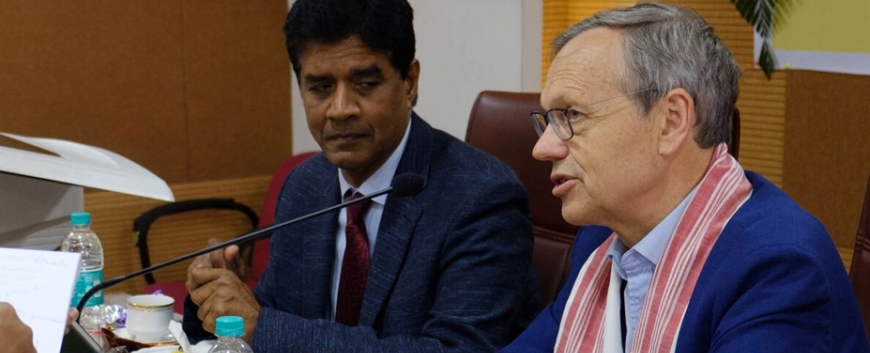RESILIENCE project to address climate change and improve smallholder adaptability
The four year multidisciplinary project launched on the 10th October aims to help more than 100 000 Indian farmers improve their adaptation to climate change and agricultural productivity.
The Norwegian Ministry of Foreign Affairs is funding the project through the Royal Norwegian Embassy in New Delhi. During the Launch, the Norwegian Ambassador to India, H.E. Nils Ragnar Kamsvåg, emphasized the importance of agriculture in India.
 The same week, the world’s leading climate scientists, in a landmark report published by the UN Intergovernmental Panel on Climate Change (IPCC), have raised alarm bells about climate change and their impact on agriculture sector and food security.
The same week, the world’s leading climate scientists, in a landmark report published by the UN Intergovernmental Panel on Climate Change (IPCC), have raised alarm bells about climate change and their impact on agriculture sector and food security.
Their message is clear: Climate change is already happening and at a faster pace than expected. Hence, urgent action and more ambitious goals are needed to cut the risks of extreme heat, drought, floods and poverty. Indeed, it is the poorest and most vulnerable who are the most affected by climate change, as, for instance, scarcity of food and failed crops increasingly becomes a threat. Norway is increasing its focus on climate smart agriculture and food security, both as a cross-cutting issue and as an issue in its own right, said the Ambassador in his speech.
The Honorable Minister of Agriculture, Mr.Atul Bora, Government of Assam, highlighted the importance of agriculture to Assam and the need for taking measures to address extreme weather events that are seriously impacting agriculture sector. He appreciated the efforts made by partners and the Norwegian Government for supporting this important project and choosing Assam as one of the project areas.
The Vice Chancellor of Assam Agricultural University, Dr Kamal Malla Bujarbaruah, emphasised the importance of enabling smallholders to adapt to climate change. Smallholder producers are important in India. 86% of Indian farmers are smallholders, and they produce 80% of the food. At the same time, 46% of Indian farmers say they are ready to leave agriculture if given an alternative, said Dr Bujarbaruah. Gender empowerment is a key to success, and the percentage of women involvement in agriculture in Assam is higher than in the rest of India at 48%, he continued.
RESILIENCE project was jointly developed with key stakeholders in Assam and Odisha, and based on many years of experience from similar projects in India, according to Director of NIBIO Centre for International Development (CID), Dr Udaya Sekhar Nagothu. He is also coordinating the project, and heading the consortium consisting of six research and university partners.
In short, Resilience aims to increase smallholders’ adaptability, agricultural productivity, profitability and nutritional benefits, reduce negative environmental impacts and enhance sustainable agricultural intensification in India, Dr Nagothu explained.
The project is setting up Village Knowledge Centres in the project areas, enabling capacity building, knowledge management and farmer-to-farmer learning. This has proven successful in the states Telangana, Andhra Pradesh and Tamil Nadu when implemented through the project ClimaAdapt.


